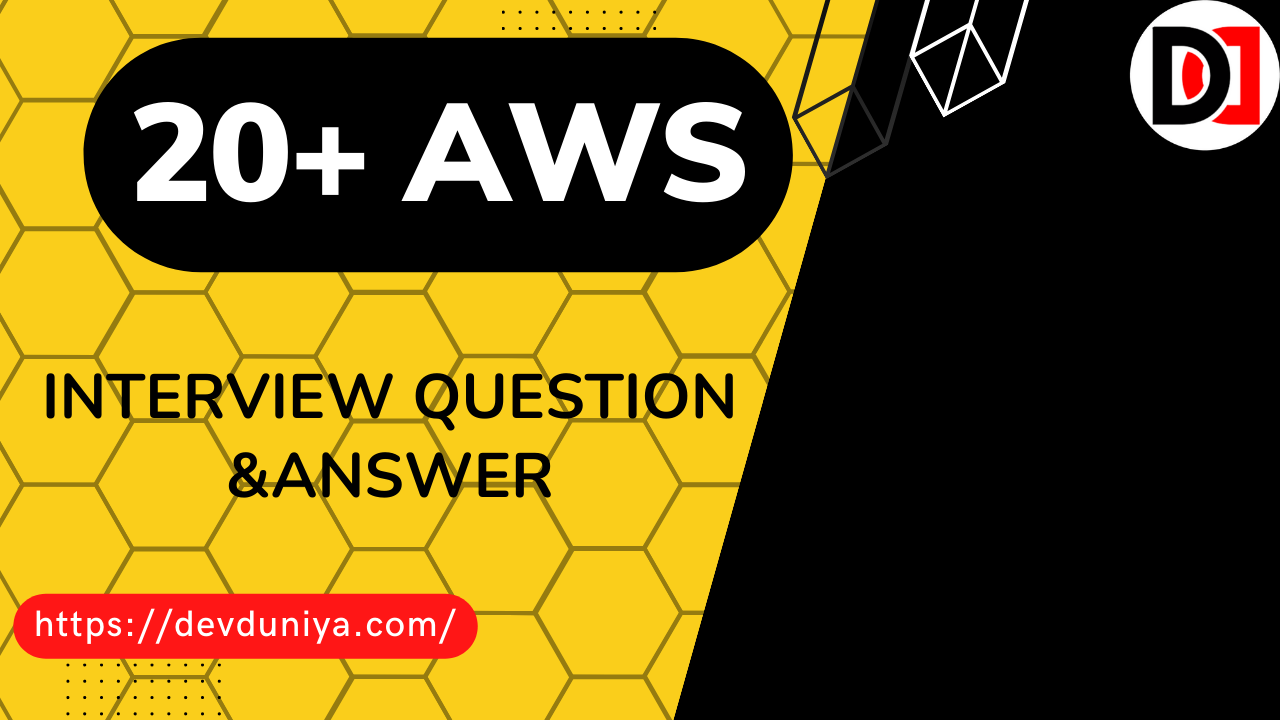Amazon Web Services (AWS) is a cloud computing platform that provides a wide range of services including computing, storage, networking, database, analytics, machine learning, security, and more. These services are designed to enable users to build and run applications and websites at scale without the need to purchase and manage physical infrastructure. AWS is owned and operated by Amazon, a leading e-commerce company.
AWS is popular among businesses of all sizes, from startups to enterprises, due to its scalability, reliability, and wide range of offerings. It is also used by government agencies and educational institutions.
Q1. What is Amazon Web Services (AWS)?
Answer: AWS is a cloud computing platform that offers a wide range of services, including computing, storage, networking, database, analytics, machine learning, security, and application development, to help organizations scale and grow.
Q2. What are the key features of Amazon EC2?
Answer:
- Elastic: Amazon EC2 allows you to scale up or down quickly and easily, depending on your needs.
- Pay-as-you-go: You only pay for the resources you use, and you can choose from a variety of pricing options to suit your budget.
- Reliable: Amazon EC2 is built to be highly available and fault-tolerant, so you can trust it to run your applications.
- Flexible: You can choose from a wide range of instance types, operating systems, and software packages to meet your specific needs.
Q3. What is Amazon S3?
Answer: Amazon S3 (Simple Storage Service) is an object storage service that offers industry-leading scalability, data availability, security, and performance. You can use S3 to store and retrieve any amount of data, at any time, from anywhere on the web.
Q4. What is Amazon RDS?
Answer: Amazon RDS (Relational Database Service) is a managed database service that makes it easy to set up, operate, and scale a relational database in the cloud. RDS supports multiple database engines, including MySQL, PostgreSQL, Oracle, and Microsoft SQL Server.
Q5. What is Amazon VPC?
Answer: Amazon VPC (Virtual Private Cloud) is a virtual network in the AWS cloud that you can use to securely launch your resources, such as Amazon EC2 instances and Amazon RDS DB instances. With VPC, you can define your own network architecture and configure security and access control to your resources.
Q6. What is Amazon EBS?
Answer: Amazon EBS (Elastic Block Store) is a block storage service that provides persistent storage for Amazon EC2 instances. You can use EBS to store data that needs to be accessed frequently, such as the operating system files of an EC2 instance or a database.
Q7. What is Amazon Route 53?
Answer: Amazon Route 53 is a scalable and highly available Domain Name System (DNS) service. You can use Route 53 to route traffic to your resources, such as Amazon EC2 instances or Amazon S3 buckets, or to create alias records that point to other AWS resources.
Q8. What is Amazon CloudFront?
Answer: Amazon CloudFront is a content delivery network (CDN) that speeds up the delivery of static and dynamic web content, such as HTML, CSS, JavaScript, and images. CloudFront uses a global network of edge locations to deliver content from the cache to users with low latency.
Q9. What is Amazon Redshift?
Answer: Amazon Redshift is a fully managed, petabyte-scale data warehouse service that makes it easy to analyze data using SQL and your existing business intelligence tools. You can use Redshift to store and analyze large amounts of data, such as logs, event data, and social media data.
Q10. What is Amazon EMR?
Answer: Amazon EMR (Elastic MapReduce) is a fully managed big data processing service that makes it easy to process and analyze large amounts of data using open-source tools, such as Apache Spark, Hadoop, and Presto. EMR can scale up or down as needed to handle your workload, and it integrates with other AWS services, such as Amazon S3 and Amazon
Q11. What is Amazon Kinesis?
Answer: Amazon Kinesis is a real-time data streaming service that enables you to ingest, process, and analyze large streams of data in real-time. You can use Kinesis to build custom applications that process and analyze streaming data, or you can use it to connect to other AWS services, such as Amazon Redshift, for analysis.
Q12. What is Amazon SNS?
Answer: Amazon SNS (Simple Notification Service) is a messaging service that enables you to send notifications to subscribers or other applications. You can use SNS to send messages through a variety of channels, including email, SMS, and mobile push notifications.
Q13. What is Amazon SQS?
Answer: Amazon SQS (Simple Queue Service) is a fully managed message queuing service that enables you to decouple and scale microservices, distributed systems, and serverless applications. You can use SQS to transmit any amount of data, at any level of throughput, without losing messages or requiring other services to be always available.
Q14. What is Amazon SES?
Answer: Amazon SES (Simple Email Service) is a cloud-based email service that enables you to send and receive email using your own email addresses and domains. You can use SES to send marketing emails, transactional emails, or any other type of email, at a low cost and with high deliverability.
Q15. What is Amazon CloudWatch?
Answer: Amazon CloudWatch is a monitoring service that provides visibility into resource and application performance, operational health, and customer experience. You can use CloudWatch to collect and track metrics, set alarms, and react to changes in your resources and applications.
Q16. What is Amazon ECS?
Answer: Amazon ECS (Elastic Container Service) is a container orchestration service that makes it easy to deploy, run, and scale containerized applications on AWS. ECS supports Docker containers and allows you to easily run and manage your applications on a highly available, scalable, and secure infrastructure.
Q17. What is Amazon EKS?
Answer: Amazon EKS (Elastic Kubernetes Service) is a fully managed Kubernetes service that makes it easy to deploy, run, and scale containerized applications on AWS. EKS supports the latest versions of Kubernetes and integrates with other AWS services, such as Amazon VPC, to provide a secure and scalable environment for your applications.
Q18. What is Amazon ECR?
Answer: Amazon ECR (Elastic Container Registry) is a fully managed container registry that makes it easy to store, manage, and deploy Docker images on AWS. ECR is integrated with other AWS services, such as Amazon ECS and Amazon EKS, and it offers security features, such as image scanning and identity-based access control, to help you secure your container images.
Q19. What is Amazon EFS?
Answer: Amazon EFS (Elastic File System) is a fully managed file storage service that makes it easy to set up, scale, and operate file storage in the cloud. EFS is designed to be used with Amazon EC2 and is ideal for workloads that require shared access to file-based storage, such as web servers, media workflows, and big data analytics.
Q20. What is AWS Lambda?
Answer: AWS Lambda is a serverless computing service that enables you to run code without provisioning or managing servers. You can use Lambda to build event-driven applications, automate workflows, create microservices, and pay only for the computing time you consume.
Q21. What is AWS Glue?
Answer: AWS Glue is a fully managed extract, transform, and load (ETL) service that makes it easy to move data between data stores. You can use Glue to discover, prepare, and move data for analytics and machine learning, or to create and publish ETL jobs that can be run at specified intervals or on demand.
Q22. What is AWS CodePipeline?
Answer: AWS CodePipeline is a continuous delivery and release automation service that helps you automate your software delivery workflows. You can use CodePipeline to build, test, and deploy your code every time there is a code change, based on the release process you define.
Q23. What is AWS CodeBuild?
Answer: AWS CodeBuild is a fully managed build service that compiles source code, runs tests, and produces software packages that are ready to deploy. You can use CodeBuild to automate the build process for your applications, and it integrates with other AWS services, such as AWS CodePipeline and AWS CodeCommit, to enable end-to-end continuous delivery.
Q24. What is AWS CodeCommit?
Answer: AWS CodeCommit is a fully managed version control service that makes it easy to host and manage Git repositories in the cloud. You can use CodeCommit to store, track, and collaborate on your code, and it integrates with other AWS services, such as AWS CodePipeline and AWS CodeBuild, to enable end-to-end continuous delivery.
Conclusion:
In conclusion, AWS is a comprehensive and reliable cloud computing platform that offers a wide range of services to help organizations build and run applications and websites at scale.
If you have any queries related to this article, then you can ask in the comment section, we will contact you soon, and Thank you for reading this article.
Follow me to receive more useful content:
Instagram | Twitter | Linkedin | Youtube
Thank you


